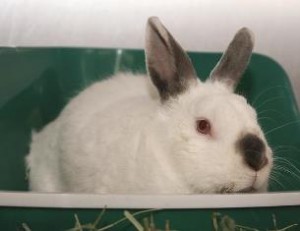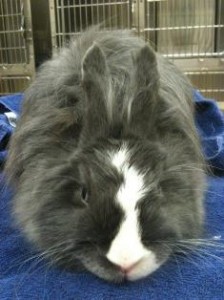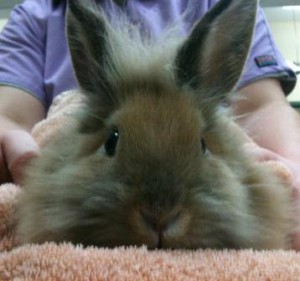If you are considering taking a pet rabbit into your home, here are a few things you need to know:
Rabbits are not rodents, they are Lagamorphs. There are many breeds to choose from, and their typical life span is 5-13 years. Once you and your family learn about the basic care and feeding they require, a rabbit can make a nice, gentle and quiet pet.

There are many breeds of rabbits to choose from.
Very young bunnies may be difficult to sex in the first 4-6 months. Females can get pregnant as early as 4-9 months, and males can breed as early as 6-9 months, so be weary of adopting two bunnies at a time or you might find yourself with many more rather quickly.
Rabbits have cloudy, strong smelling urine, and healthy rabbits produce a large amount of fecal pellets daily. However, they can be easily litter box trained. We do recommend recycled pelleted paper like Yesterday’s News. The litter needs to be digestible and not toxic if eaten. Therefore, do not use corncob, walnut shell, shavings or clay litters. These can be dangerous for your new bunny.
It’s very important to learn how to properly handle a rabbit. Improper handling can result in a struggling bunny who scratches a person or who breaks a leg, hip or back. To teach children, have them sit on the floor beside the rabbit first, and let them rub the rabbit’s belly. The rabbit can be hypnotized this way. Never pick a bunny up by its ears. Rather bundle it in a blanket. We call this a “bunny burrito.” This will help the rabbit remain calm.

Bunny Burrito
To carry a rabbit, its head should be tucked into your arms and your forearms used to support the rabbit along the entire back and beneath the belly. Cat carriers provide enough space and ventilation for travel in the car.

The proper way to hold a rabbit
Rabbits don’t require the traditional veterinary care as far as vaccines. However, it is very important that they are examined ideally twice a year by a veterinarian in order to check weight, teeth and nails. Rabbits will not show any obvious signs of disease. They will hide their illness even more so than other pets because they are a predatory-type species, so regular wellness exams are vital. Exams are also an opportunity to discuss first-hand with your vet what you need to know to keep your pet healthy.
 Males and females should be neutered at six months of age. We recommend you see a veterinarian with solid Exotic Pet experience. It’s particularly important to spay the female. If you don’t, female rabbits over the age of 4 years have a 50-80% chance of suddenly developing deadly uterine cancer. At that point, surgery is usually not going to save your pet. Prevention is key to this disease. If they are spayed at the recommended young age, they have a 100% chance of never dying from uterine cancer or an infected uterus (pyometra).
Males and females should be neutered at six months of age. We recommend you see a veterinarian with solid Exotic Pet experience. It’s particularly important to spay the female. If you don’t, female rabbits over the age of 4 years have a 50-80% chance of suddenly developing deadly uterine cancer. At that point, surgery is usually not going to save your pet. Prevention is key to this disease. If they are spayed at the recommended young age, they have a 100% chance of never dying from uterine cancer or an infected uterus (pyometra).
Rabbits nibble continuously. We recommend you feed your rabbit unlimited grass hay or Timothy hay such as OXBOW. Your rabbit should have no more than 1/8 cup of high fiber (18% or more) maintenance type pellets per 5 lbs.
You can also feed a minimum of one cup vegetables for each 4 lbs. of body weight. You can select three different types of dark green or yellow vegetables daily such as alfalfa sprouts, basil, beet greens, broccoli leaves, Brussels sprouts, carrot and carrot tops, cilantro, collard greens, endive, green peppers, parsley, romaine lettuce, kale, outer cabbage leaves, wheatgrass, pea pods (but not peas), squash, radicchio or dandelion leaves.
You may add a small amount of fruit (up to three types) totaling 1-2 level Tbs per 5 lbs. body weight. Stick to high fiber fruits like apple, peach, plum, pear, melon, raspberry, papaya, blueberry, blackberry, strawberry and pineapple. Avoid sugary fruits like bananas and grapes, and feed no fruits at all if dieting.
You should clean your rabbit’s cage at least once a week. Avoid the use of a water bowl, and use attachable water bottles with sipper tubes instead. You must check their water bottle regularly, and make sure water is not dripping down their chin. They can get blue fur disease which is a pseudomonas infection spot under their chin.
Make sure they are not sitting completely on wire, as they can develop bumble foot sores which are painful and will require a veterinarian’s treatment. Provide bedding that you can change frequently.
Because rabbits love to chew, they should not be confined all time. However, please supervise them when out of the cage, as they are likely to chew on miscellaneous object and things like carpets. Foot thumping is a warning signal, they can also panic scream or growl.
When it comes to illness preventive care, here are a few things to remember:
1. Urine and feces should never be allowed to accumulate in the litter box.
2. Please weigh your rabbit monthly and let your veterinarian know of the slightest weight change.
3. Regular dental care by a trained veterinarian is a must.
4. Trim nails frequently and brush your bunny’s fur 1-2 times a week (long haired breeds daily).

It’s important to brush your rabbit regularly, especially a long-haired breed like this one.
5. Your rabbit will experience hair balls, otherwise known as trichobezoars. Trichobezoars happen more with rabbits who are over fed and eat too many pellets and not enough hay, and groom or molt excessively, especially when stressed. These hairballs can lead to “wool block” which leads to their stomach and intestines shutting down. That can lead to death within three days if their GI system is not jump started. It is fine to give a feline laxative (laxatone) or pineapple (not the juice) after grooming to prevent hair balls.
Regular wellness exams with your veterinarian will give you the opportunity to discuss first-hand proper care for your new friend. Please don’t hesitate to call our office to ask a question or set up an appointment.
Joe Martins, DVM, Belle Mead Animal Hospital

Joe Martins, DVM, Belle Mead Animal Hospital


